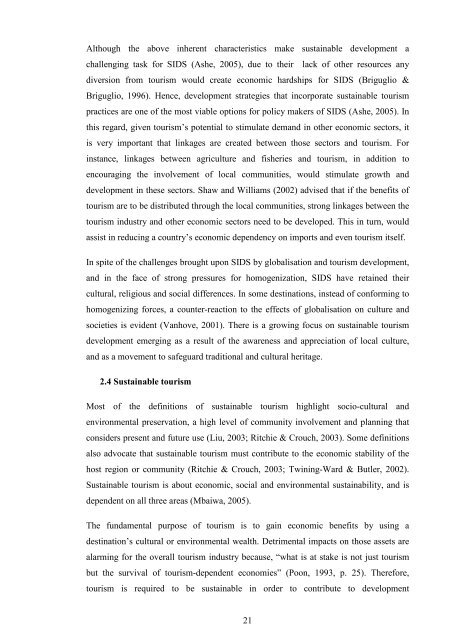The Role of Local Food in Maldives Tourism - Scholarly Commons ...
The Role of Local Food in Maldives Tourism - Scholarly Commons ...
The Role of Local Food in Maldives Tourism - Scholarly Commons ...
You also want an ePaper? Increase the reach of your titles
YUMPU automatically turns print PDFs into web optimized ePapers that Google loves.
Although the above <strong>in</strong>herent characteristics make susta<strong>in</strong>able development a<br />
challeng<strong>in</strong>g task for SIDS (Ashe, 2005), due to their lack <strong>of</strong> other resources any<br />
diversion from tourism would create economic hardships for SIDS (Briguglio &<br />
Briguglio, 1996). Hence, development strategies that <strong>in</strong>corporate susta<strong>in</strong>able tourism<br />
practices are one <strong>of</strong> the most viable options for policy makers <strong>of</strong> SIDS (Ashe, 2005). In<br />
this regard, given tourism’s potential to stimulate demand <strong>in</strong> other economic sectors, it<br />
is very important that l<strong>in</strong>kages are created between those sectors and tourism. For<br />
<strong>in</strong>stance, l<strong>in</strong>kages between agriculture and fisheries and tourism, <strong>in</strong> addition to<br />
encourag<strong>in</strong>g the <strong>in</strong>volvement <strong>of</strong> local communities, would stimulate growth and<br />
development <strong>in</strong> these sectors. Shaw and Williams (2002) advised that if the benefits <strong>of</strong><br />
tourism are to be distributed through the local communities, strong l<strong>in</strong>kages between the<br />
tourism <strong>in</strong>dustry and other economic sectors need to be developed. This <strong>in</strong> turn, would<br />
assist <strong>in</strong> reduc<strong>in</strong>g a country’s economic dependency on imports and even tourism itself.<br />
In spite <strong>of</strong> the challenges brought upon SIDS by globalisation and tourism development,<br />
and <strong>in</strong> the face <strong>of</strong> strong pressures for homogenization, SIDS have reta<strong>in</strong>ed their<br />
cultural, religious and social differences. In some dest<strong>in</strong>ations, <strong>in</strong>stead <strong>of</strong> conform<strong>in</strong>g to<br />
homogeniz<strong>in</strong>g forces, a counter-reaction to the effects <strong>of</strong> globalisation on culture and<br />
societies is evident (Vanhove, 2001). <strong>The</strong>re is a grow<strong>in</strong>g focus on susta<strong>in</strong>able tourism<br />
development emerg<strong>in</strong>g as a result <strong>of</strong> the awareness and appreciation <strong>of</strong> local culture,<br />
and as a movement to safeguard traditional and cultural heritage.<br />
2.4 Susta<strong>in</strong>able tourism<br />
Most <strong>of</strong> the def<strong>in</strong>itions <strong>of</strong> susta<strong>in</strong>able tourism highlight socio-cultural and<br />
environmental preservation, a high level <strong>of</strong> community <strong>in</strong>volvement and plann<strong>in</strong>g that<br />
considers present and future use (Liu, 2003; Ritchie & Crouch, 2003). Some def<strong>in</strong>itions<br />
also advocate that susta<strong>in</strong>able tourism must contribute to the economic stability <strong>of</strong> the<br />
host region or community (Ritchie & Crouch, 2003; Tw<strong>in</strong><strong>in</strong>g-Ward & Butler, 2002).<br />
Susta<strong>in</strong>able tourism is about economic, social and environmental susta<strong>in</strong>ability, and is<br />
dependent on all three areas (Mbaiwa, 2005).<br />
<strong>The</strong> fundamental purpose <strong>of</strong> tourism is to ga<strong>in</strong> economic benefits by us<strong>in</strong>g a<br />
dest<strong>in</strong>ation’s cultural or environmental wealth. Detrimental impacts on those assets are<br />
alarm<strong>in</strong>g for the overall tourism <strong>in</strong>dustry because, “what is at stake is not just tourism<br />
but the survival <strong>of</strong> tourism-dependent economies” (Poon, 1993, p. 25). <strong>The</strong>refore,<br />
tourism is required to be susta<strong>in</strong>able <strong>in</strong> order to contribute to development<br />
21

















